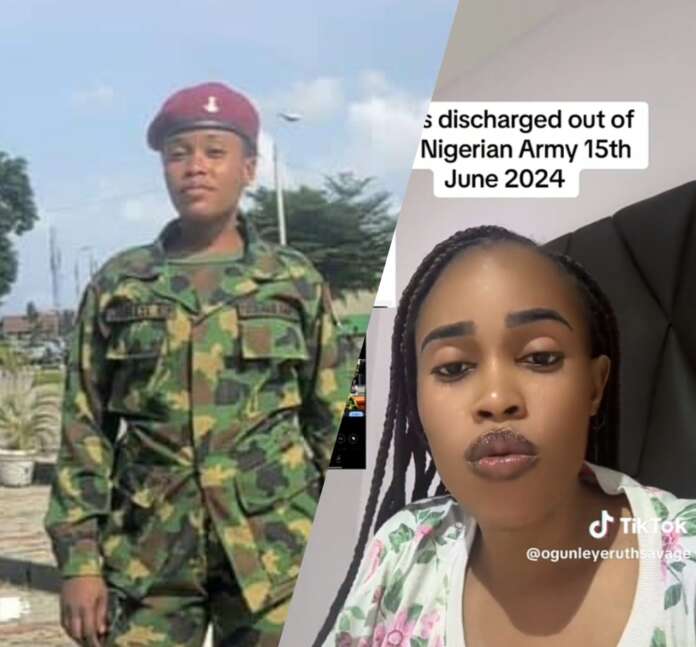- Watch Arise News video analysis on the victim
Mabel Adinya Ade’s reflections
The recent dismissal of Ruth Ogunleye, a female Army officer who reported being raped by a senior officer, is a chilling reminder of the pervasive culture of gender-based violence, impunity, and human rights violations in Nigerian. Her case, where she was not only dismissed from service but also branded as “mentally unstable,” sheds light on a much larger and deeply entrenched issue within the armed forces and beyond one that continues to plague women and girls across Nigeria, particularly in conflict-affected regions like Plateau, Benue, Kaduna, Borno, Adamawa, and Yobe.
The Betrayal of Justice
Ruth Ogunleye’s case is not an isolated one but rather part of a grim pattern in which women in the Nigerian Army and other security forces are subjected to sexual violence, harassment, and mistreatment. The fact that Ogunleye, who bravely reported the assault, was dismissed instead of being offered protection and support is not only deeply distressing but also an affront to justice. This treatment reflects an abuse of power and a systematic failure to protect vulnerable individuals who risk their lives in service to the nation.
This is compounded by the fact that military personnel, especially women, have long faced sexual harassment and assault in the line of duty. In conflict zones, where violence is rampant, there have been multiple allegations of security forces including the army argeting women and girls for sexual exploitation. In some cases, the mere presence of a gun is enough to coerce victims into silence, forcing them to submit to sexual abuse or intimidation. The victims, many of whom lack the courage or support to speak out, often suffer in silence.
A Kangaroo Investigation: No Justice in Sight
The army’s response to Ogunleye’s complaint appears to reflect a disturbing lack of accountability. Instead of ensuring that an independent and transparent investigation was conducted, the army swiftly moved to discredit her, labelling her as mentally unstable. This knee-jerk response only deepens the culture of impunity and gender-based violence that already exists within military structures.
When allegations of sexual violence are made within any institution, there should be an independent body tasked with investigating the complaint one that is impartial, transparent, and respectful of due process. The use of a military-led internal investigation, without external oversight, serves only to protect the perpetrators and further victimize the survivors. In Ogunleye’s case, the denial of justice, combined with her public humiliation, amplifies the trauma she has already endured.
The Far-reaching Consequences of Gender-based Violence in the Military
The repercussions of this case are not just felt by Ogunleye but reverberate through the broader spectrum of female soldiers and women in Nigeria. This reflects a larger issue of systemic gender-based violence within the military and across Nigeria’s security forces. Women are often regarded as expendable commodities either sexually violated in conflict zones or silenced when they report abuse. This deprives them of their basic human rights, and their dignity is stripped away by those who should be protecting them.
For women serving in conflict areas, the fear of sexual violence and harassment by their own comrades in arms is ever-present. This erosion of safety and respect for women creates an environment where victims of violence are not only denied justice but are further stigmatized and humiliated. The painful irony is that the very institutions entrusted with defending the country become the perpetrators of harm, particularly against women and girls.
The Call for Justice and Accountability
It is crucial that the Nigerian Army, and indeed all institutions, learn from Ruth Ogunleye’s tragic experience. Whether or not Ogunleye’s allegations are true, dismissing her without due process, while branding her as mentally unstable, is deeply problematic. Every individual deserves a fair investigation, regardless of their status or gender, and the rights of victims must be protected. If she lied, there should be legal avenues to address it, but this should not justify her humiliation or further harm.
The military and other security forces must be held accountable for the abuse of power and gender-based violence, both within their ranks and in the communities they serve. The government must ensure that robust systems are in place to protect victims and that those found guilty of abuse are prosecuted to the full extent of the law and I hope strongly the Federal Ministry of Women Affairs charged with the reasonability of advocating for women and girls and indeed women and well-meaning Nigerians will act right to protect Ruth Ogunleye.
A Wider Call to End Gender-Based Violence in Nigeria
This incident calls for a broader societal reflection on the prevalence of sexual violence and harassment in Nigeria, particularly in conflict zones. Women in the military, women in communities, and girls in schools must be afforded the respect and protection they deserve. This case underscores the urgent need for legal and institutional reforms that prioritize gender equity, safeguard women’s rights, and ensure that those in positions of authority, including within the military, are held accountable for their actions.
Indeed, the tragic case of Ruth Ogunleye highlights a pressing need for the National Assembly to reconsider its stance on the Violence Against Persons Prohibition (VAPP) Law, which is currently at risk of repeal. This law, which was designed to provide a comprehensive legal framework for the protection of individuals from all forms of violence, particularly gender-based violence, stands as a critical tool in the fight for justice and equality in Nigeria.
The VAPP Law has already proven to be a step in the right direction by recognizing various forms of violence, including sexual harassment, domestic abuse, and harmful traditional practices, and providing victims with legal avenues for redress. However, the threat of repeal sends a dangerous signal, not only to survivors of violence like Ruth Ogunleye but to all Nigerians especially women who rely on the law for protection in the face of abuse.
If this law is repealed or undermined, it would be a grave setback for gender equality and human rights in the country. This case underscores the urgent need for robust legal frameworks that protect women and girls from abuse, particularly within institutions like the military, where gender-based violence has long been a silent epidemic. By repealing or weakening the VAPP Law, the National Assembly would not only fail to support survivors but also enable the continuation of impunity, where perpetrators of sexual violence can act with little fear of legal consequence.
The National Assembly must stand firm in its commitment to protecting the rights of women and girls in Nigeria. Repealing or weakening the VAPP Law would undermine years of advocacy and progress made to hold perpetrators accountable and ensure that victims receive justice.
This case should serve as a wake-up call for lawmakers to not only preserve but strengthen the VAPP Law. They must act decisively to send a message that gender-based violence in all forms, whether in the military or society, will not be tolerated. It is time for the National Assembly to ensure that their laws reflect a true commitment to human rights and justice for every citizen, especially women who have long been marginalized and victimized
Conclusion: Justice for Ruth Ogunleye
Ruth Ogunleye has selflessly served her country, and it is imperative that she is afforded the dignity and justice she deserves. The Nigerian Army’s actions against her, if unchallenged, will only contribute to the ongoing culture of abuse and impunity in the country. We must demand an independent investigation into her case, and if true, those responsible must be held accountable. At the same time, society must come together to challenge and dismantle the systems that perpetuate gender violence, both within the military and across Nigerian society.
The true measure of a nation’s commitment to human rights is how it treats its most vulnerable citizens, and in Ruth Ogunleye’s case, Nigeria has failed. Let us stand for justice, for accountability, and for the rights of women who serve their country with dignity.
Written By:
Mabel Adinya Ade,
Gender Equality Advocate and Executive Director,
Adinya Arise Foundation (AAF)
8 Eket Close, Area 8,
Garki Abuja- Nigeria




